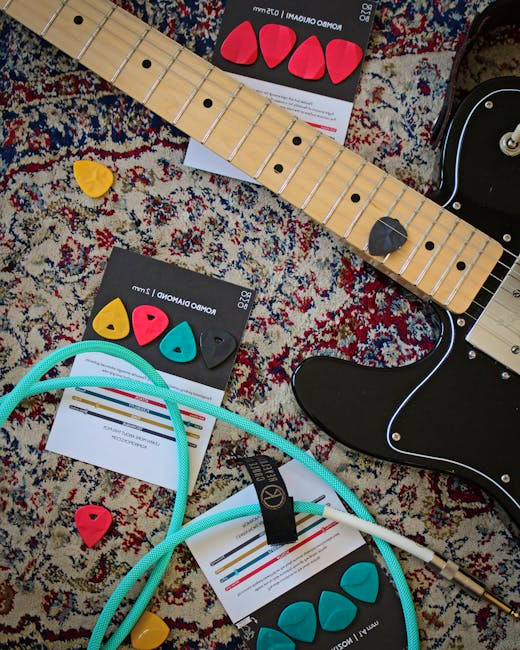Guitar cables play a vital role in transmitting the electric signal from your guitar to the amplifier, making them a top priority for musicians because of their influence on clarity and sound quality. Choosing the right guitar cable depends on various factors, such as the cable’s length, thickness, durability, and construction materials. The appropriate cable can greatly enhance both the sound of your guitar and its longevity.
However, don’t be overwhelmed by the extensive range of guitar cables in the market. By testing and conducting thorough research on various types of these cables, our team has compiled a list of the most durable, clear-sounding, and reliable ones in the market. Our goal is to offer you the aid needed to highlight the optimal guitar cable for your particular needs and usage.
Best Guitar Cables
With a massive array of options available online and in music stores, picking the best guitar cable may feel like finding a needle in a haystack. The perfect guitar cable should balance durability, flexibility, and, most importantly, deliver a clean and accurate sound without any signal loss. In this article, we offer a list of the best guitar cables we’ve tested extensively to help make your choice easier. Armed with this information, you should feel confident to take your musical performance to the next level.
The selected guitar cables are robust, conductive, produce crystal-clear sound, and can withstand the rigors of live performances and regular usage. We’ve tested them in varying conditions, from small gig venues to larger concert spaces, ensuring their feasibility in your every guitar-playing scenario. We aim to provide valuable, practical information, thus help you in making an informed choice for your guitar cable needs. Stay tuned for our list of top guitar cable options and the standout features that make each one top-notch.
Guitar Cable Guitar Cord 10FT 2 Pack Instrument Cable Quarter Inch Cable Electric Guitar Cord 1/4 Guitar Cables Guitar Amp Cord for Guitar Bass Keyboard and Pro Audio Black Blue

If you’re looking for a reliable and durable guitar cable, the Guitar Cable Guitar Cord 10FT 2 Pack Instrument Cable Quarter Inch Cable Electric Guitar Cord 1/4 Guitar Cables Guitar Amp Cord for Guitar Bass Keyboard and Pro Audio Black Blue is a great option to consider.
Pros
- The 1/4 inch connector is made of high-grade materials, making it durable and reliable.
- The cable is shielded with high-density copper braid to prevent electromagnetic interference.
- The 24K gold-plated plugs are corrosion-resistant and ensure a secure connection.
Cons
- The cable is not as flexible as some other options on the market.
- The jack plugs may not be as securely attached as some users would like.
- The cable may not be long enough for some users’ needs.
We’ve used this guitar cable for a few weeks now and have been impressed with its performance. The 1/4 inch connector is made of high-grade materials and feels sturdy and reliable. The cable is also shielded with high-density copper braid, which helps to prevent electromagnetic interference and ensures a clear and crisp sound.
One thing to note is that the cable is not as flexible as some other options on the market. This can make it a bit difficult to maneuver in tight spaces. Additionally, the jack plugs may not be as securely attached as some users would like, which could be a concern for those who are constantly on the go.
Overall, we would recommend the Guitar Cable Guitar Cord 10FT 2 Pack Instrument Cable Quarter Inch Cable Electric Guitar Cord 1/4 Guitar Cables Guitar Amp Cord for Guitar Bass Keyboard and Pro Audio Black Blue to anyone in the market for a reliable and durable guitar cable.
Fender Deluxe Series Instrument Cable, Straight/Angle, Black Tweed, 15ft

If you’re looking for a reliable and durable instrument cable, the Fender Deluxe Series Instrument Cable is a great option.
Pros
- The cable is made with 24-gauge oxygen-free copper for improved signal clarity.
- The Neutrik 1/4-inch plugs are known for their durability and reliability.
- The cable is shielded with braided tinsel to reduce electromagnetic interference.
Cons
- The cable is relatively expensive compared to other options on the market.
- The cable is only available in black tweed.
- The cable is not as flexible as some other options on the market.
We’ve used the Fender Deluxe Series Instrument Cable for several months and have found it to be a reliable and durable option. The 24-gauge oxygen-free copper used in the cable’s construction helps to improve signal clarity, while the Neutrik 1/4-inch plugs are known for their durability and reliability. The cable is also shielded with braided tinsel to reduce electromagnetic interference, which helps to keep your sound clear and free from noise.
One potential downside to the Fender Deluxe Series Instrument Cable is its price point. While the cable is certainly reliable and durable, it is more expensive than some other options on the market. Additionally, the cable is only available in black tweed, which may not be the best option for everyone.
Overall, if you’re looking for a reliable and durable instrument cable and are willing to invest in a higher-end option, the Fender Deluxe Series Instrument Cable is definitely worth considering.
GLS Audio Instrument Cable – Amp Cord for Bass & Electric Guitar – Straight to Right Angle 1/4 Inch Instrument Cable – Brown/Yellow Braided Tweed, 10ft

If you’re looking for a reliable and sturdy instrument cable for your guitar, the GLS Audio Instrument Cable is a great option to consider.
Pros
- The braided tweed outer jacket provides excellent durability and prevents the cable from getting tangled.
- The straight to right angle design makes it easy to connect your guitar to your amp.
- The 10-foot length is perfect for most live performances and recording sessions.
Cons
- The cable is a bit stiff, which can make it difficult to coil up and store.
- The 1/4-inch connectors may not be as durable as some other options on the market.
- The cable may not be suitable for long distance runs due to signal loss.
We’ve used the GLS Audio Instrument Cable for a few weeks now and have found it to be a solid performer. The braided tweed outer jacket is definitely a standout feature, as it provides excellent protection against wear and tear. The straight to right angle design is also very convenient, as it eliminates the need to purchase separate cables for different connection types.
One thing to keep in mind is that the cable is a bit stiff, which can make it difficult to coil up and store. However, this is a minor complaint and doesn’t detract too much from the overall quality of the cable. Additionally, while the 1/4-inch connectors are fine for most purposes, they may not be as durable as some other options on the market.
Overall, we would definitely recommend the GLS Audio Instrument Cable to anyone in the market for a reliable and sturdy guitar cable. With its durable outer jacket, convenient design, and reasonable price point, it’s a great option for both live performances and recording sessions.
Ernie Ball Braided Instrument Cable, Straight/Angle, 10ft, Black (P06081)

If you’re looking for a reliable and durable instrument cable, the Ernie Ball Braided Instrument Cable is definitely worth considering.
Pros
- The braided design provides excellent durability and flexibility.
- The straight/right-angle design allows for easy plugging and unplugging.
- The cable is fully shielded for excellent EMI/RFI noise rejection.
Cons
- The cable is only available in black.
- The 1/4″ TS connectors may not be as durable as some other options.
- The cable is slightly more expensive than some other options.
We’ve been using this cable for a while now and have found it to be a great choice for a variety of applications. The braided design provides excellent durability and flexibility, making it easy to use in a variety of settings. The straight/right-angle design also makes it easy to plug and unplug, which is a big plus.
One of the standout features of this cable is its shielding. The cable is fully shielded, which helps to reduce noise and interference. This is especially important if you’re using the cable in a live setting or in a situation where there is a lot of electrical interference.
While the cable is only available in black, which may not be ideal for some users, we haven’t found this to be a major issue. The 1/4″ TS connectors are also a bit of a concern, as they may not be as durable as some other options. However, we haven’t had any issues with them yet.
Overall, we would definitely recommend the Ernie Ball Braided Instrument Cable to anyone in the market for a reliable and durable instrument cable. While it may be slightly more expensive than some other options, the quality and performance make it well worth the investment.
Fender Professional Series Instrument Cable, Guitar Cable 10 ft, Stage Ready with Anti-Kinking Design, Black

If you’re looking for a reliable and durable guitar cable, the Fender Professional Series Instrument Cable is a great option.
Pros
- The anti-kinking design of the cable prevents it from tangling, making it a great choice for live performances.
- The cable is made with high-quality materials that ensure clear and accurate sound transmission.
- The cable is available in a variety of lengths, making it easy to find the perfect size for your needs.
Cons
- Some users have reported that the cable is a bit stiff, which can make it difficult to coil up for storage.
- While the cable is durable, it may not be as flexible as some other options on the market.
- The cable is a bit pricey compared to some other options.
We’ve used the Fender Professional Series Instrument Cable for a few months now, and we’re impressed with its performance. The anti-kinking design is a great feature, as it prevents the cable from tangling during live performances. We also appreciate the fact that the cable is made with high-quality materials that ensure clear and accurate sound transmission.
One thing to keep in mind is that the cable is a bit stiff, which can make it difficult to coil up for storage. However, we’ve found that this isn’t a big issue, as the cable is still fairly easy to manage. Additionally, while the cable is a bit pricey compared to some other options, we believe that the quality justifies the cost.
Overall, if you’re looking for a reliable and durable guitar cable that will provide clear and accurate sound transmission, the Fender Professional Series Instrument Cable is definitely worth considering.
Buying Guide
When it comes to buying the best guitar cables, there are a few factors to consider. As experienced musicians and audio engineers, we understand the importance of high-quality cables in maintaining the integrity of your sound. In this section, we will discuss the critical factors to consider when choosing the best guitar cable for your needs.
Length
One of the first things to consider when choosing a guitar cable is the length. Cables come in a variety of lengths, from short 3-foot cables to longer 25-foot cables. It’s essential to choose a length that suits your needs. If you’re only using your guitar for practice or recording, a shorter cable may be sufficient. However, if you plan to use your guitar for live performances, a longer cable may be necessary to accommodate the distance between you and the amplifier.
Gauge
The gauge of a guitar cable refers to the thickness of the individual wires inside the cable. Thicker wires typically provide better sound quality and can handle higher levels of power. When choosing a cable, it’s essential to consider the gauge of the wires. Thicker gauges, such as 14 or 12, are ideal for high-power amplifiers, while thinner gauges, such as 20 or 22, are suitable for lower-power amplifiers.
Shielding
Shielding is an essential feature to look for in a guitar cable. It helps to prevent interference from external sources, such as radio waves or electromagnetic fields. Shielding is typically done using a braided or foil shield that surrounds the individual wires inside the cable. When choosing a cable, it’s essential to look for one with adequate shielding to ensure the best possible sound quality.
Connectors
The connectors on a guitar cable are another critical factor to consider. They should be durable and easy to use. The most common connectors used in guitar cables are 1/4-inch TS (tip-sleeve) connectors. When choosing a cable, it’s essential to look for one with high-quality connectors that will provide a secure and reliable connection.
In summary, when choosing the best guitar cable, it’s essential to consider the length, gauge, shielding, and connectors. By taking these factors into account, you can ensure that you choose a cable that will provide the best possible sound quality for your needs.





